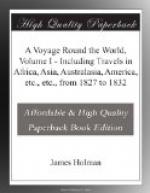Mr. Thomas Park, who left England, as one of the Midshipmen of the Sybille, but with three years leave of absence from his ship so soon as she arrived on the coast, ordered by the Admiralty for the express purpose of travelling in Africa, with the avowed intention of endeavouring to discover the course, and source of the Niger, was landed at Accra some time since from that ship, and passed a short time there in studying some of the languages of the countries through which he meant to travel. He left Accra to proceed on his journey into the interior on the 29th of September, 1827, and arrived at Mampong in Aquapim on the 2nd of October; this he left on the 5th for Acropong, the chief town of Aquapim, and on the 10th left Acropong, for Aquambo, a town at the head of the Volta river, where he arrived on the 16th of October. I heard that he had been kindly treated, so far as he had penetrated, but at the last mentioned place, he took a fancy to climb a particular tree, which the natives entreated him to desist from, saying that it was Fetished,[27] however, he persisted and accomplished his wish. A few days after this he was taken ill, and as every one knows, he did not survive to tell his own story: perhaps the precise cause of his death will ever remain in doubt. This gentleman was a son of the celebrated Mungo Park, than whom no man was better calculated for such an enterprise, and whose loss is perhaps more to be regretted than that of any other African traveller; but I lament to say that from the moment I heard of his son, an inexperienced young man, undertaking an enterprise of such magnitude, as that of penetrating alone into the interior of an unknown country, to solve a problem in the pursuit of which so many distinguished travellers had failed and fallen, I confess I never supposed he would live to return: in fact, the project appeared to me, what is emphatically expressed in the old proverb, “a wild-goose chase.” For where men of maturer judgment and greater experience found that they could not contend against the superstitions, prejudices, and artifices of those cunning savages, how was it to be expected that a youth of nineteen could possibly succeed?
I have heard, that his desire for travelling in Africa, arose from a romantic notion, that had entered his head when a boy, of seeking for his father in the interior of that country, to ascertain whether he was alive and in slavery, or had lost his life by sickness, or violence. This filial enthusiasm continued to haunt him until a short time before he left England, when he abandoned the fond hope of recovering his father, whose death was confirmed by a variety of coincident circumstances, but still he resolved to persevere in his long-cherished scheme of visiting the interior of Africa. Impelled, perhaps, by the name he inherited, and a latent passion to emulate the deeds of his father, on the same field of action, he embarked in this hazardous and unfortunate enterprise.




